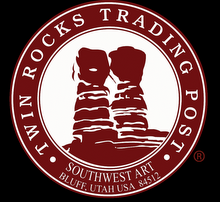Many people seem to view museums as a place to see interesting objects, and, if you are fortunate, to have a little good conversation with the attendants. I can certainly understand that sentiment, some of my best museum experiences involve looking at the beautiful items on display while talking with members of the staff. I am extremely fortunate to have been invited into the curation rooms of some nice museums, and have seen many unusual objects. In most cases, the explanations of curators and docents added more to the artifacts than I could have imagined.
One thing I have realized about the items we sell is that the art is to a large extent about the artist, and the artist is quite often molded by his or her art. When I look at a weaving by Eleanor Yazzie, for example, I see her peeking out from behind the fibers; I see her children and her yellow pickup truck and hear her voice. In a Tommy Jackson bracelet, I see him riding his Harley Davidson motorcycle, with his eyes shaded by narrow sunglasses. To me, it is those elements that make Eleanor's weavings and Tommy's silver work so special. People are surely the most important part of our museum, and the exhibit is constantly changing, depending on who is in the store at that particular time.
Each visitor to the trading post has his or her own treasures to display and stories to tell. They have all experienced life in a different way, and are, in essence, mobile museums. Their exhibits include culture from around the world, adventure in countless arenas and knowledge about exotic topics.
Yesterday, Skip wandered into the trading post after hiking around Cottonwood Wash. His personal exhibit that afternoon focused on trees. After many years as an architect, Skip had decided he was better suited to the life of a fruit grower. As a result, he has purchased acreage with a variety of fruit trees in Colorado and begun life anew. As he talked about the trees and how they have changed his life, a smile spread across his face and he began to glow. Skip told me about his grandfather, who had allowed him to work in his garden; planting the seeds of a love that had been dormant for over 40 years. Unexpectedly, the seeds recently sprouted, and Skip's love could not be denied.
Skip told me how he had been out hiking recently and come upon a small sandstone drainage where several juniper trees had taken root in the sparse soil many decades ago. He said the trees were huge, twisted and stunning. Then he blurted out, "I just walked over and gave them a hug." I understood his emotion, that is how I feel about many of the people who come into the trading post and share their beauty with us. Being a bit shy, I have refrained from hugging our patrons on most occasions, but am feeling my inhibitions fade as I grow older.
Skip and I talked about a tree Jana had recently purchased from a nursery in Moab. After we completed the transaction, the greenhouse attendant helped me put the tree in the back of our truck and bid us farewell. Before we drove off, I asked whether the unprotected tree would be all right on such a long journey, and he said, "No problem, we have pretty strong winds here in Moab." On the drive home, I agonized over every leaf skittering down the highway as I watched in the rear view mirror. When we pulled over, I could see the damage that had been done to the remaining leaves.
After I related the story to Skip, he said, "You know, it's going to take a long time, lots of care and plenty of water and fertilizer to make that tree okay again. It will need lots of love to survive." That is the beauty of the exhibits on display almost every day at the Twin Rocks Museum; we never know what treasures will be unveiled.
Sincerely,
Steve

